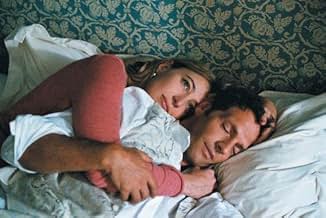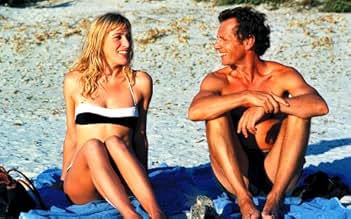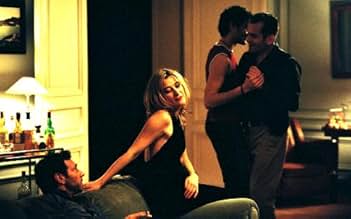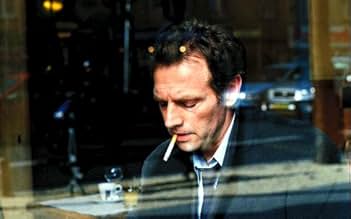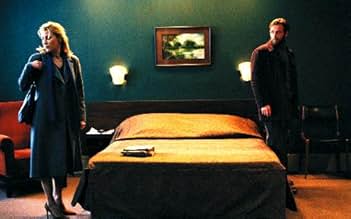5x2
- 2004
- Tous publics
- 1h 30m
IMDb RATING
6.6/10
11K
YOUR RATING
Five stages in the romance between a woman and a man.Five stages in the romance between a woman and a man.Five stages in the romance between a woman and a man.
- Director
- Writers
- Stars
- Awards
- 1 win & 2 nominations total
Valeria Bruni Tedeschi
- Marion
- (as Valeria Bruni-Tedeschi)
Ninon Brétécher
- Sophie
- (as Ninon Bretecher)
- Director
- Writers
- All cast & crew
- Production, box office & more at IMDbPro
Featured reviews
This film is about 5 segments of the relationship between Gilles and Marion in reverse chronological order.
I thought the reverse chronological order would make it as confusing as "Memento", but actually it is very simple to understand. The film highlights 5 different time segments that is pivotal to the relationship. What happens in between the segments is not mentioned. It leaves the viewers much room for imagination and interpretation.
It is a story about real human beings. No one is flawless. The carnal desire of Gilles, and his shameless expression of it, destroys his love life. Valerie's passionless attitude and negativity destroys her relationship. Marion, on the other hand, gets repeatedly disappointed with life. Everything in the film is so real and close to us, unlike most films that portray fairytale couples or unrealistic lives.
I particularly like the childbirth segment, as emotions are well portrayed and affecting. I think this film is good, but not as groundbreaking as I expected it to be.
I thought the reverse chronological order would make it as confusing as "Memento", but actually it is very simple to understand. The film highlights 5 different time segments that is pivotal to the relationship. What happens in between the segments is not mentioned. It leaves the viewers much room for imagination and interpretation.
It is a story about real human beings. No one is flawless. The carnal desire of Gilles, and his shameless expression of it, destroys his love life. Valerie's passionless attitude and negativity destroys her relationship. Marion, on the other hand, gets repeatedly disappointed with life. Everything in the film is so real and close to us, unlike most films that portray fairytale couples or unrealistic lives.
I particularly like the childbirth segment, as emotions are well portrayed and affecting. I think this film is good, but not as groundbreaking as I expected it to be.
10ellkew
This is one of the most resonant films I have seen for a long time. Superb performances by both leads and a simple but very effective structure. To begin at the end and move backwards to look at moments, glimpses, fragments is such a simple device yet devastatingly effective as demonstrated with such expertise by Ozon here. I found certain moments deeply moving such as the physical assault on his wife. It seemed like a desperate attempt by the husband to try and claim power over his wife. But we know that the relationship is in the final throes of death. I loved the scene on the wedding night when she looks at her mother and father who we have previously seen rowing, just dancing alone at the reception. Somehow you know that their relationship will last and there is hope for them. The adultery the wife commits seemed to work although at first I thought it too contrived. Her pleasure on seeing her husband and love for him as he sleeps when she creeps back into the room felt very real. For me however the most beautiful and most moving sequence was the end when they first meet. It was wonderfully set up and echoed real life so well. It is always a series of events, a chain that causes all the pieces to fall in the right place and the couple to meet. It such a subtle scene when they talk on the beach as we know they are about to fall in love. When they walk into the golden sea bathed in light the two are literally becoming one as they embark on a new chapter in both their lives. The beauty of the scene is made more powerful by the conflicting emotion in our minds as we know that this love will be destroyed. How can something so perfect ever diminish? What Ozon is saying is that all things must die, that surely it is better to have loved and lost than never to have loved at all. Go and see this film. It is marvellous.
The end and beginning of the love of the French couple Marion (Valeria Bruni-Tedeschi) and Gilles (Stéphane Freiss) is disclosed backwards through five moments in their lives:
1st moment: They divorce and have one last brutal intercourse without love.
2nd moment: With their relationship shaken, they have a dinner party with Gilles's gay brother Christophe (Antoine Chappey) and his younger mate, when an infidelity is disclosed at the dinner table.
3rd moment: The troubled pregnancy of Marion and the delivery of their premature son Nicolas, with the total absence of Giles.
4th moment: Their wedding, when Marion commits adultery with an unknown guest of the hotel.
5th moment: .When they meet each other in an Italian resort and begin their relationship.
This simple and realistic movie recalls "Irreversible" (2002), since the screenplay discloses five moments of the relationship of a couple chronologically backwards. I believe the first intention of François Ozon is to remember that behind every divorce, there is a couple that loved each other in the past, that decided to marry each other expecting to live together and raise a family of their own. However, relationships usually deteriorate and time destroys everything including love. In these fragmented glimpses of the lives of Marion and Gilles, the viewer does not see exactly when their love ended, but after their initial encounter, there are many signs suggesting the beginning of the end: the adultery of Marion in the wedding night; the absence of Gilles in the birth of his son; his consented participation in an orgy in the presence of Marion, visibly showing one sort of last attempt to save their empty marriage. Further to the good screenplay, the outstanding and strong performances of the sexy Valeria Bruni-Tedeschi and Stéphane Freiss give the credibility to the characters. My vote is seven.
Title (Brazil): "Amor em 5 Tempos" ("Love in 5 Times")
1st moment: They divorce and have one last brutal intercourse without love.
2nd moment: With their relationship shaken, they have a dinner party with Gilles's gay brother Christophe (Antoine Chappey) and his younger mate, when an infidelity is disclosed at the dinner table.
3rd moment: The troubled pregnancy of Marion and the delivery of their premature son Nicolas, with the total absence of Giles.
4th moment: Their wedding, when Marion commits adultery with an unknown guest of the hotel.
5th moment: .When they meet each other in an Italian resort and begin their relationship.
This simple and realistic movie recalls "Irreversible" (2002), since the screenplay discloses five moments of the relationship of a couple chronologically backwards. I believe the first intention of François Ozon is to remember that behind every divorce, there is a couple that loved each other in the past, that decided to marry each other expecting to live together and raise a family of their own. However, relationships usually deteriorate and time destroys everything including love. In these fragmented glimpses of the lives of Marion and Gilles, the viewer does not see exactly when their love ended, but after their initial encounter, there are many signs suggesting the beginning of the end: the adultery of Marion in the wedding night; the absence of Gilles in the birth of his son; his consented participation in an orgy in the presence of Marion, visibly showing one sort of last attempt to save their empty marriage. Further to the good screenplay, the outstanding and strong performances of the sexy Valeria Bruni-Tedeschi and Stéphane Freiss give the credibility to the characters. My vote is seven.
Title (Brazil): "Amor em 5 Tempos" ("Love in 5 Times")
10meitschi
As another reviewer before me, I also can't believe how badly people are writing about this film here. I adore Francois Ozon and I've seen all his feature-length films. This one seems quite different from the others (except, maybe, Sous le sable) and it's as low-key as Ozon could ever get, but it is still an excellently scripted and played film that makes one think.
I didn't consider the backwards structure to be gimmicky at all, it rather helped the viewer to better make out flaws early in the relationship. There is betrayal in each one of the episodes, starting with the last (chronologically the first) one. The film shows us that even little egoisms and uncharitable behavior can lead to grave consequences - in this case, to divorce. The woman, Marion, seems to be easily led anywhere, not having enough standing of her own, while the man, Gilles, seems to be egoistic, cowardly and sometimes just simply sex-crazed.
I think the structure rather helps us to understand the characters better, since we have already seen the consequences of their actions and attitudes. I didn't consider the large gaps between (and also in) the episodes to be a problem - they only acknowledge that the whole story can never be told because it is made up by every single moment between their first meeting and the last time they see each other. These episodes can only indicate what went wrong, they cannot explain - that would be too simplistic.
The actors were excellent, especially Valeria Bruni-Tedeschi. The way the looks of the main characters changed during the film (becoming more and more youthful and fresh as the story goes backwards), was also excellently done.
The parallel love stories (between Gilles's brother and his young lover, and between Marion's parents) shed some more light on the relationship between Marion and Gilles - also on what might have gone wrong.
This film should probably be required viewing for every couple wanting to get married... :-) Not in order to deter them, but rather to make them aware of the pitfalls of relationships and married life.
I didn't consider the backwards structure to be gimmicky at all, it rather helped the viewer to better make out flaws early in the relationship. There is betrayal in each one of the episodes, starting with the last (chronologically the first) one. The film shows us that even little egoisms and uncharitable behavior can lead to grave consequences - in this case, to divorce. The woman, Marion, seems to be easily led anywhere, not having enough standing of her own, while the man, Gilles, seems to be egoistic, cowardly and sometimes just simply sex-crazed.
I think the structure rather helps us to understand the characters better, since we have already seen the consequences of their actions and attitudes. I didn't consider the large gaps between (and also in) the episodes to be a problem - they only acknowledge that the whole story can never be told because it is made up by every single moment between their first meeting and the last time they see each other. These episodes can only indicate what went wrong, they cannot explain - that would be too simplistic.
The actors were excellent, especially Valeria Bruni-Tedeschi. The way the looks of the main characters changed during the film (becoming more and more youthful and fresh as the story goes backwards), was also excellently done.
The parallel love stories (between Gilles's brother and his young lover, and between Marion's parents) shed some more light on the relationship between Marion and Gilles - also on what might have gone wrong.
This film should probably be required viewing for every couple wanting to get married... :-) Not in order to deter them, but rather to make them aware of the pitfalls of relationships and married life.
The 'reverse chronology' format, that has now been tried and tested a few times, will perhaps one day become as unshockingly acceptable as the more prosaic use of 'flashbacks'. Both involve non-linear storytelling, and both attempt to grab audience attention by time distortions. Flashbacks are now so commonplace within mainstream films that the 'purist' Dogme movement banned them altogether being so structurally clichéd and rarely justified. So when Ozon's 5 x 2 tells a love story about two people in five chapters, but starting with the last chapter and working forward, is he using a valid artistic device or just being gimmicky? In the opening scene, our loving couple (Marion and Gilles) are finalising the details of their divorce. Afterwards they have a last-fling sexual bout which takes an unpleasant turn. Flipping back scene by scene, we next see them as a loving married and entertaining visitors, chatting away about fidelity and sexual deviance and again we see a slightly unpleasant turn perhaps the seeds of the divorce that we already know will happen. In each chapter we follow the love story to earlier and earlier stages.
In Irreversible, another French film, the reverse chronology format was used to shock, to take us on a journey from hell to heaven. In Memento it was used to heighten suspense and provide the basic device that the mystery revolved upon we never knew more than the main character about what had happened before.
In 5 x 2 the effect is to highlight small things that go wrong in a fairly ordinary relationship. If it were a gradual decline from better to worse they might have gone unnoticed, but our starting point being divorce our interest in why things went wrong is perhaps more acute.
The other thing that marks out this slightly unusual film is the remarkable acting range shown by Valeria Bruni Tedeschi (who won Best Actress at the Venice Film Festival for her portrayal of Marion). We see not only an incredible range of emotion but many sides to her character. The finely nuanced performance draws attention to things like the person a woman may be to her husband whilst still have a secret side, or her ability to put on a brave face when crying inside. The observation of a range of emotional and sexual explorations is done with the attention to detail that seems so intrinsic to much French cinema: the characters really seem to feel what is happening as if there is no camera on them at all. Sadly 5 x 2 however may not have the shock value of film like Irreversible or the sugar-candy feelgood factor of films like Amelie: mainstream foreign audiences like their French movies to nevertheless fulfil certain passive entertainment criteria, which this thinking and understated movie obstinately refuses to do.
In Irreversible, another French film, the reverse chronology format was used to shock, to take us on a journey from hell to heaven. In Memento it was used to heighten suspense and provide the basic device that the mystery revolved upon we never knew more than the main character about what had happened before.
In 5 x 2 the effect is to highlight small things that go wrong in a fairly ordinary relationship. If it were a gradual decline from better to worse they might have gone unnoticed, but our starting point being divorce our interest in why things went wrong is perhaps more acute.
The other thing that marks out this slightly unusual film is the remarkable acting range shown by Valeria Bruni Tedeschi (who won Best Actress at the Venice Film Festival for her portrayal of Marion). We see not only an incredible range of emotion but many sides to her character. The finely nuanced performance draws attention to things like the person a woman may be to her husband whilst still have a secret side, or her ability to put on a brave face when crying inside. The observation of a range of emotional and sexual explorations is done with the attention to detail that seems so intrinsic to much French cinema: the characters really seem to feel what is happening as if there is no camera on them at all. Sadly 5 x 2 however may not have the shock value of film like Irreversible or the sugar-candy feelgood factor of films like Amelie: mainstream foreign audiences like their French movies to nevertheless fulfil certain passive entertainment criteria, which this thinking and understated movie obstinately refuses to do.
Did you know
- TriviaIn the French edition of the DVD, the director offers a version of the movie titled "2 x 5". This version shows the five sequences in the chronological order, from the moment the couple meets till their divorce. Subtle editing work has been applied to make the movie work.
- GoofsThe scene where the American came to Marion during the wedding night and introduced himself who arrived in France today and would leave tomorrow for LA. Who would just do that? It's just lame.
(Answer: someone not coming from the USA, for instance.)
- How long is Five Times Two?Powered by Alexa
Details
- Release date
- Country of origin
- Official sites
- Languages
- Also known as
- Cinq fois deux
- Filming locations
- Production companies
- See more company credits at IMDbPro
Box office
- Budget
- €5,250,784 (estimated)
- Gross US & Canada
- $128,752
- Opening weekend US & Canada
- $15,667
- Jun 12, 2005
- Gross worldwide
- $7,444,906
- Runtime
- 1h 30m(90 min)
- Sound mix
- Aspect ratio
- 1.85 : 1
Contribute to this page
Suggest an edit or add missing content


